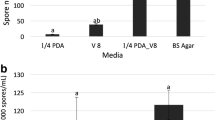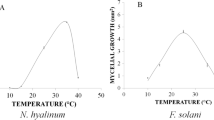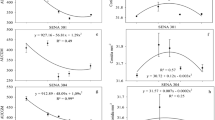Summary
It is shown in these studies that the germination of the conidia ofFusarium culmorum (W.G.Sm.) Sacc. is influenced by both constitutive and exogenous factors. In a dense suspension, selfinhibited spores are induced to germinate by dilution with distilled water and by suspending in either sucrose solution or wheat root exudates. The exudates not only stimulate conidial germination but also promote subsequent growth of the fungus. The significance of this in pathogenesis is discussed.
Similar content being viewed by others
References
Allen, P. J., The role of self-inhibitor in the germination of rust uredospores. Phytopathology45, 259–266 (1955).
Buxton, E. W., Differential rhizosphere effects of three pea cultivars on physiologic races of Fusarium oxysporum f. pisi. Brit. Mycol. Soc. Frans.40, 305–317 (1957).
Cochrane, V. W., Physiology of Fungi. John Wiley and Sons Inc., New York (1958).
Cochrane, V. W., Spore germination. Plant Pathology, an advanced treatise. Edited by Horsfall, J. G. and Dimond, A. E. Academic Press, New York (1960).
Garrett, S. D., Biology of root infecting fungi. Cambridge Univ. Press, London and New York (1956).
Gottlieb, D., The physiology of spore germination in fungi. Botan. Rev.16, 229–257 (1950).
Kerr, A., Summary and synthesis of papers on the soil, the plant root and the rhizosphere. Symposium on Ecology of soil-Borne plant pathogens, 248 (1964).
Lin, C. K., Nutrient requirements in the germination of the conidia ofGlomerella cingulata. Am. J. Botany32, 269–298 (1945).
Rovira, A. D., Plant root excretions in relation to the rhizosphere effect. II. A study of the properties of root exudate and its effect on the growth of micro-organisms isolated from the rhizosphere and control soil. Plant and Soil7, 195–208 (1956).
Schroth, M. N. and Snyder, W. C., Effect of host exudates on chlamydospore germination of the bean root rot fungus,Fusarium solani f. phaseoli. Phytopathology 51, 389–393 (1961).
Sussman, A. S., Dormancy of soil micro-organisms in relation to survival. Symposium on Ecology of Soil-Borne Plant Pathogens, 248 (1964).
Van Sumere, C. F., Preter, C. Van Sumere-De, and Ledingham, G.A., Coumarins and phenolic acids in the uredospores of wheat stem rust. Can. J. Microbiol.3, 847–862 (1957).
Warcup, J. H., Growth and reproduction of soil micro-organisms in relation to substrate. Symposium on Ecology of Soil-Borne Plant Pathogens, 52 (1964).
Yarwood, C. E., Simultaneous self-stimulation and self-inhibition of uredospore germination. Mycologia48, 20–24 (1956).
Author information
Authors and Affiliations
Rights and permissions
About this article
Cite this article
Onuorah, P.E. The influence of sucrose and wheat root exudates on the germination and growth of conidia ofFusarium culmorum (W.G.S.M.) Sacc. Plant Soil 29, 27–32 (1968). https://doi.org/10.1007/BF01393909
Received:
Issue Date:
DOI: https://doi.org/10.1007/BF01393909




